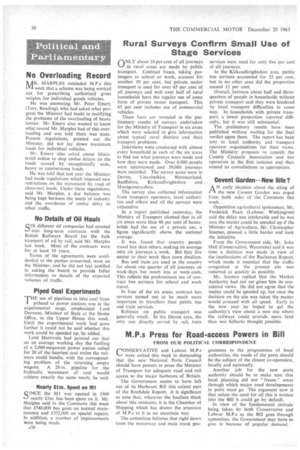Rural Surveys Confirm Small Use of Stage Services
Page 32

If you've noticed an error in this article please click here to report it so we can fix it.
r-INLY about 10 per cent of all journeys
rural areas are made by public transport. Contract buses, taking passengers to school or work, account for another 10 per cent, but private motor transport is used for over 65 per cent of all journeys and well over half of rural households have the regular use of some form of private motor transport. This 65 per cent includes use of commercial vehicles.
These facts are revealed in the preliminary results of surveys undertaken for the Ministry of Transport in six areas which were selected to give information about typical rural districts and their transport problems.
Interviews were conducted with almost every household in each of the six areas to find out what journeys were made and how they were made. Over 6,000 people were interviewed and 39,000 journeys were me-circled. The survey areas were in Devon, Lincolnshire, Westmorland.
Banffshire, Kirkcudbrightshire and Montgomeryshire.
The survey also collected information from transport operators, local authorities and others and all the surveys were exhaustive.
In a report published yesterday, the Ministry of Transport showed that in all six areas more than 40 per cent of households had the use of a private car, a figure significantly above the national average.
It was found that country people travel less than others, making on average only six journeys a week. But they live nearer to their work than town dwellers.
Bus and train are used in the country for about one quarter of all journeys on week-days but much less at week-ends. This reflects the predominant use of contract bus services for school and work travel.
In four of the six areas, contract bus services turned out to be much more important to travellers than public bus and train services.
Reliance on public transport was generally small. In the Devon area, the only one directly served by rail, train services were used for only five per cent af all journeys.
In the Kirkcudbrightshire area, public bus services accounted for 25 per cent, but in no other area did the proportion exceed 12 per cent Overall, between about half and threequarters of people in households without private transport said they were hindered by local transport difficulties in some way. In households with private transport, a lower proportion reported difficulty, but it was still substantial.
The preliminary results have been published without waiting for the final verdict upon them. The report has been sent to local authority and transport operator organizations for their views. The Ministry proposes to consult the County Councils Association and bus operators in the first instance and then extend its consultations as appropriate.
Covent Garden—New Site?
AN early decision about the siting of the new Covent Garden was urged from both sides of the Commons this week.
Opposition agricultural spokesman, Mr. Frederick Peart. (Labour, Workington) said the delay was intolerable and he was sure the matter could be speeded up if the Minister of Agriculture, Mr. Christopher Soames, pressed a little harder and took the initiative.
From the Government side, Mr. John Hall (Conservative, Wycombe) said it was time a decision was made in view of the implications of the Buchanan Report, which made it essential that the traffic congestion at the present site was removed as quickly as possible.
Mr. Soames replied that the Market Authority had not yet given him its considered views. He did not agree that the matter could be speeded up, but once the decision on the site was taken the matter would proceed with all speed. Early in the new year he hoped to get the authority's view about a new site where the railways could provide more land than was hitherto thought possible.




























































































